Samaaro + Your CRM: Zero Integration Fee for Annual Sign-Ups Until 30 June, 2025
- 00Days
- 00Hrs
- 00Min
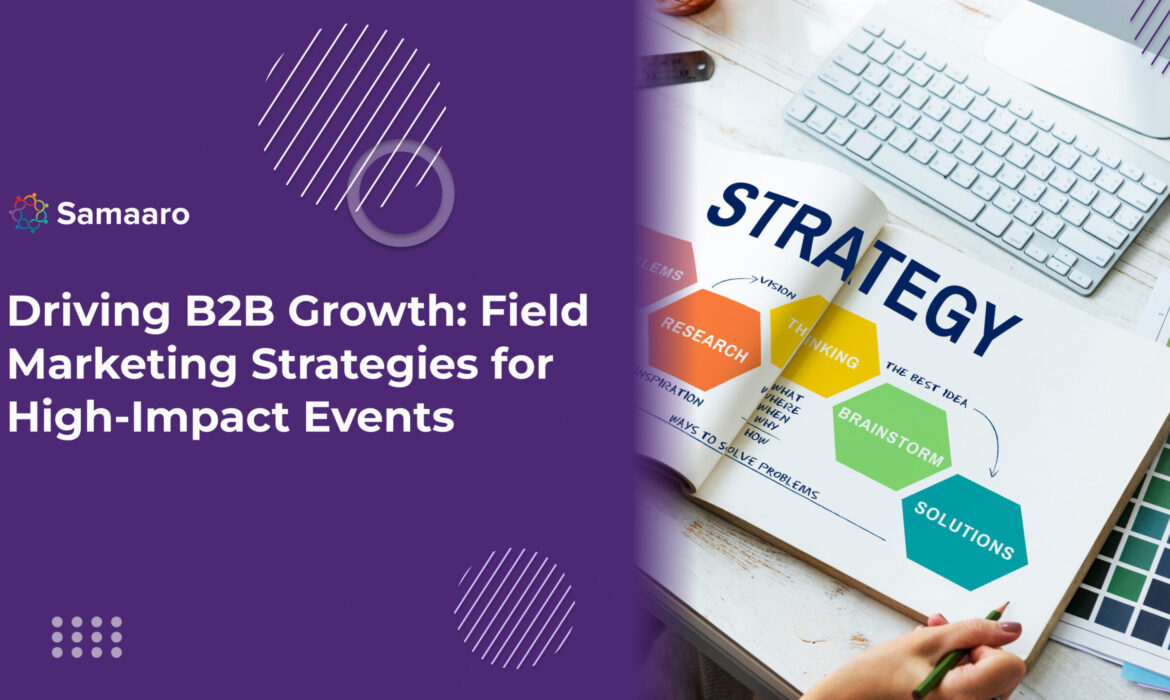
A. Not Your Everyday Marketing: Why B2B Field Marketing is Critical for Growth
In an intricate B2B sales cycle, traditional digital marketing can only take you so far. Although automated funnels, webinars, and email sequences are all key components – too often they cannot help build real relationships and facilitate enterprise-level decision-making. That’s where Field Marketing in B2B comes into play.
Field marketing diminishes the distance between digital outreach and high-touch engagement. It provides an avenue for marketers to engage their key accounts personally, directly, and in a customized way, activating experiences on the ground that resonate with their buyers, facilitates meaningful conversations, and moves opportunities down the B2B sales pipeline.
Experiential and in-person events are among the most powerful tools for B2B brands. Whether the format is a trade show or an executive roundtable, high-impact events build trust, stimulate discussion, and create urgency for decisions.
And high-impact field marketing lead generation through events has proven itself time and again for B2B brands, whether your priority is high-quality attendee lead generation, strengthening existing customer relations, or closing enterprise deals.
When executed effectively, your B2B event strategy transforms your event from merely creating exposure for your brand, into one of your key levers for growth. Strategic event touchpoints effectively integrates sales and marketing efforts, creates entry points for ICPs into your ecosystem, and accelerates sales cycles.
This guide equips you to more fully realize the potential of field marketing for B2B growth. Let’s explore:
Planning a first activation, or looking to refine a mature field marketing program, this guide offers real-world steps to take your events to the next level and increase your pipeline.
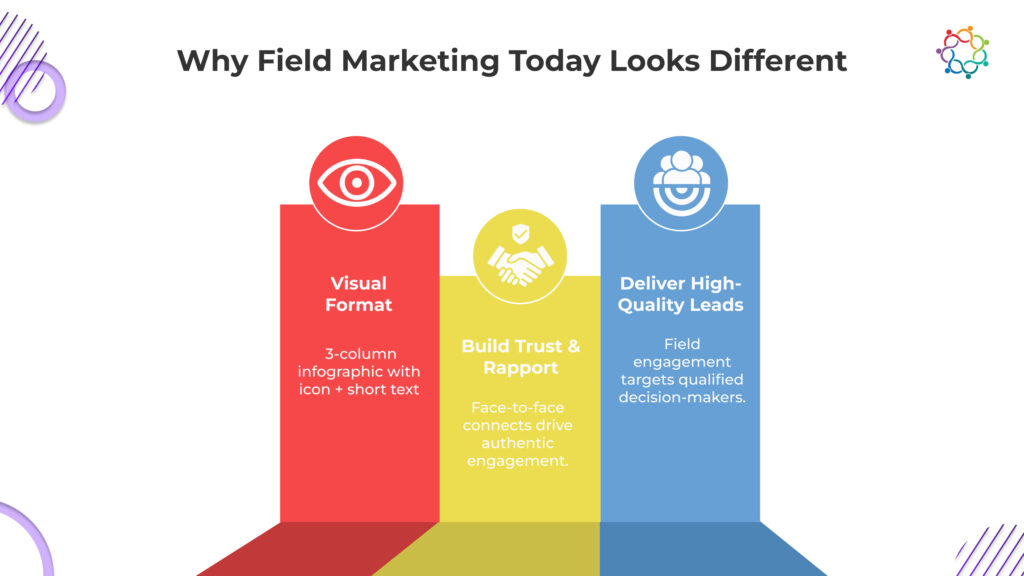
Before we get into a number of useful tactics, it is critical to establish a strong foundation for your B2B Field Marketing strategy when planning events. That means defining clear goals, and who you are targeting, and identifying a suitable event format to accomplish those goals. With an inappropriate groundwork, even very well-executed events can be completely misaligned.
A. Defining your B2B Field Marketing goals for the event
Ultimately, the success of your planning of B2B events can largely be defined by clarity. What do you want your field marketing efforts to drive?
Is your objective to generate Marketing Qualified Leads (MQL) and Sales Qualified Leads (SQL), increase deal velocity, increase brand awareness benefits in a defined region, or improve customer advocacy? Regardless, your objectives should always be measurable, and correlate closely with business outcomes.
Getting clear on these areas early will also help to shape your measurements for the overall event sales pipeline metrics, from lead capture to revenue attribution.
Creating an effective B2B event strategy is nearly impossible if you don’t know who you are speaking to. You want to start with a definitive understanding of your ideal customer profiles (ICPs) in detail, what challenges they may have, how they make decided to purchase, and what content or experiences resonates with them.
This understanding will dictate everything from how you marshal messaging in your pre-event campaigns to how you design the experience on-site. It will also support your decision-making process for the event type, timing, and location, which promotions support Field Marketing Lead Generation.

Not all events are equal, nor do they all equal what you want them to. A solid B2B field marketing portfolio will incorporate different types and scales of events that fulfill your various buying journey goals.
Trade Show Field Marketing: Ideal for brand awareness, product demo, and more top of funnel opportunities. Look for large trade shows, expos, or conferences that your target accounts may be attending.
Conference Field Marketing: Great for thought leadership and mid-funnel opportunities. Use speaking or sponsorship opportunities and consider leveraging on-site networking events.
Small-Scale (high-impact formats), including dinners, executive roundtables, workshops, roadshows. These formats are where you can engage for a longer duration in an ABM-style opportunity, where the deeper conversation and building a relationship engaged your audience.
Event Model Considerations: In-person events are generally considered the best experience for experiential marketing for B2B, but don’t eliminate virtual or hybrid options where applicable to your audience and scale. The objective is to find the ideal event model that allows you to best accomplish your goals, with the resources and event elements available to you.
The best B2B event strategies are not about handling logistics; they are about the role the event has in the effectiveness of moving prospects through the sales funnel. Every step of the event life cycle, regardless of where it is in the funnel, can be used as an opportunity for Field Marketing Lead Generation and pipeline acceleration.
A. Strategic Pre-Event Engagement: Building Anticipation & Attendance
The Field Marketing game starts way before the event starts…and pre-event engagement sets the foundation and ensures the right attendee (most importantly, the decision-maker on your target account) shows up energize and ready to engage.
An aggressive pre-event approach can drastically increase attendance and positively prime your audience before the event, especially at ABM events where relationship depth is crucial.
Now that the event has started, your focus has turned to making this all count. The on-site value experience is not only memorable but also drives interest and intent.
When you utilize these tactical approaches, you are helping to create a relationship between your brand and the audience as a partner instead of just a vendor, the difference we are seeking to develop through best practices in B2B events.
Every interaction with high-impact potential should result in a directed next step. This is the next level when tech-enabled lead capture and qualification tracking systems are introduced.
The swifter your team can respond, the more likely it is that those event–rate leads convert through the pipeline and thus validates the event as compressing the B2B sales cycle.
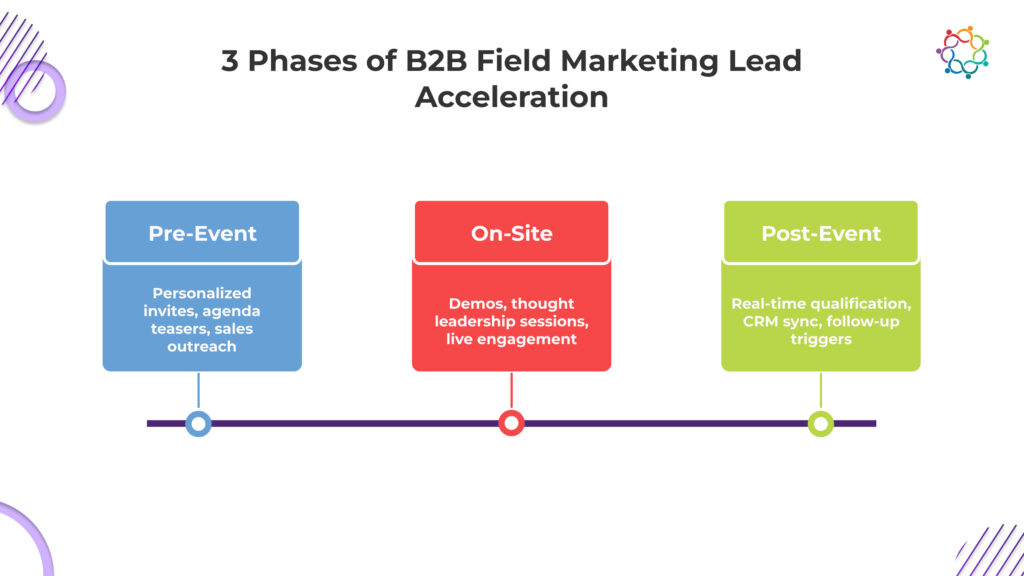
In B2B, the most constructive relationships aren’t accidental, they’re intentional. The experiential marketing and Account-Based Field Marketing (ABM Events) elevates your field experience from functional to memorable. You connect through emotional intelligence and curated experiences and debrief the accounts that matter.
A. Beyond the Booth: Experiential Field Marketing Ideas for B2B Audiences
Today’s decision makers want more than just a product pamphlet and a 10X10 space with walls. Your audience wants to “experience” your brand.
Experiential field marketing in B2B events is what will create those experiences. These high touchpoints are created to stimulate curiosity, drive engagement, and provide an impression that your audience will remember.
Consider:
An exclusive demo experience for a specific vertical or experience(s) related to your Ideal Customer Profile. Interactive challenges, or gamified product demonstrations, that demonstrate real-life value.
A “product journey” customized for attendee profiles, that provides a walkthrough not an overview of the product. Unique hospitality experiences, think curated dinners, live entertainment, or lounges designed for C-level guests. These tactics help move you from vendor to value partner and develop trust and loyalty, both essential for B2B events.
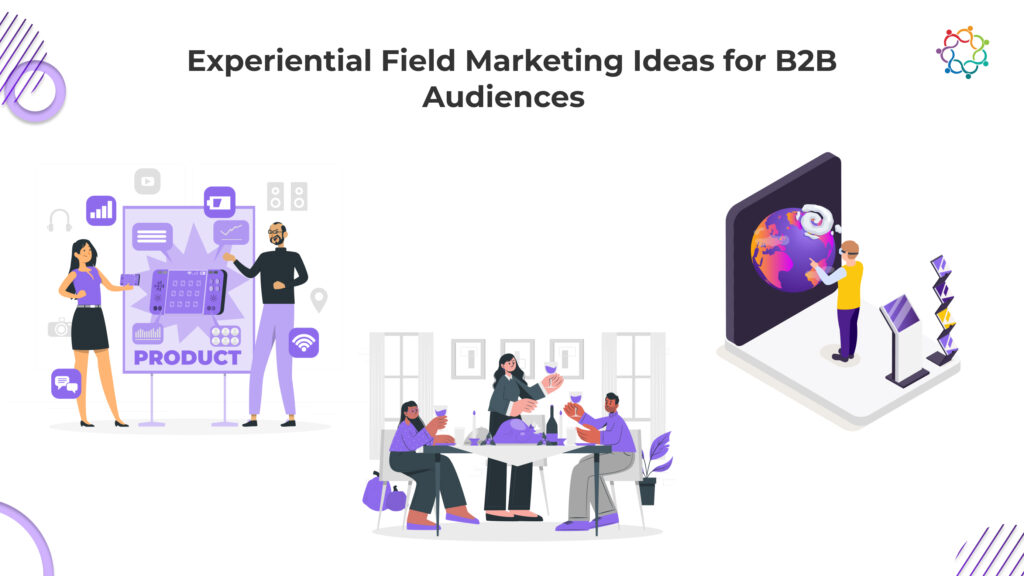
Experiential tactics are even more powerful when you use them with an Account Based Marketing agenda. So not only are your events targeting companies, but they are specifically targeting key financial account(s).
Here is how to tie your Field Marketing B2B efforts with an ABM strategy:
Utilize your ABM data to smartly target decision makers and influencers in those organizations and send invitations for the event.
Again, these ABM event tactics not only deepen relationships, but influence revenue generation, accelerate deal velocity, shorten the overall sales cycle, and increase overall win rates with tailored experiences directing targeted efforts by segment.
Just because the event is over doesn’t mean the impact is over. How you follow up in the hours and days after a B2B event will determine if the investment is turned into pipeline or lost in the noise.
A. Fast & Personalized Post-Event Nurture (A Field Marketer’s Cheat Sheet)
The number one best practice in B2B event planning is to follow up in a timely manner. Timely follow-up is critical, especially after field marketing has brought in the right prospects.
In the post-event follow-up, consider:
This type of targeted, fast-paced follow up shows that your brand is listening, remembering, and adding value; an important step in post-event follow-up for sales.
Field marketing does not end with a handoff, it relies on sales and marketing collaboration.
Key points for your sales team to know:
When marketing and sales operate together, the journey from lead to deal is faster, and more predictable.
It’s not enough to say an event “went well.” You have to demonstrate impact, in metrics that matter.
Track key Field Marketing Lead Generation measures:
Wrap it all in a digestible field marketing ROI report for internal stakeholders. This is how you keep the investment flowing in the right channels, as well as justify data-driven future field marketing expansion.

In today’s complex B2B world, field marketing is no longer a “nice to have” it’s a growth engine.
In this guide, we’ve detailed how impactful B2B event strategies from trade shows to roundtables to experiential activations to ABM-focused events can:
But the real value is what’s next: seamless post-event nurturing, sales alignment, and proved ROI.
Effective B2B field marketing is not only about events; it’s about creating meaningful human connections that move the needle on your business goals.
Are you ready to elevate your B2B event strategy and accelerate your sales pipeline?
Find out how Samaaro can support your field marketing efforts from planning and producing events to real-time analytics and ROI measurement.

Built for modern marketing teams, Samaaro’s AI-powered event-tech platform helps you run events more efficiently, reduce manual work, engage attendees, capture qualified leads and gain real-time visibility into your events’ performance.
Location
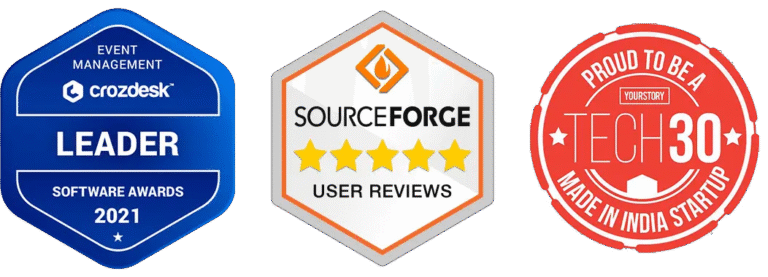
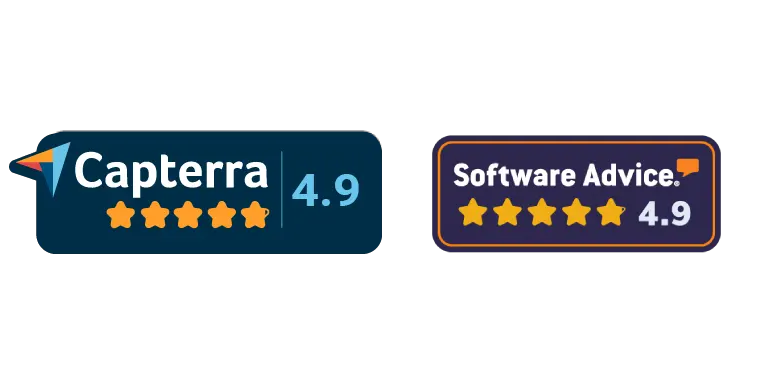
© 2026 — Samaaro. All Rights Reserved.